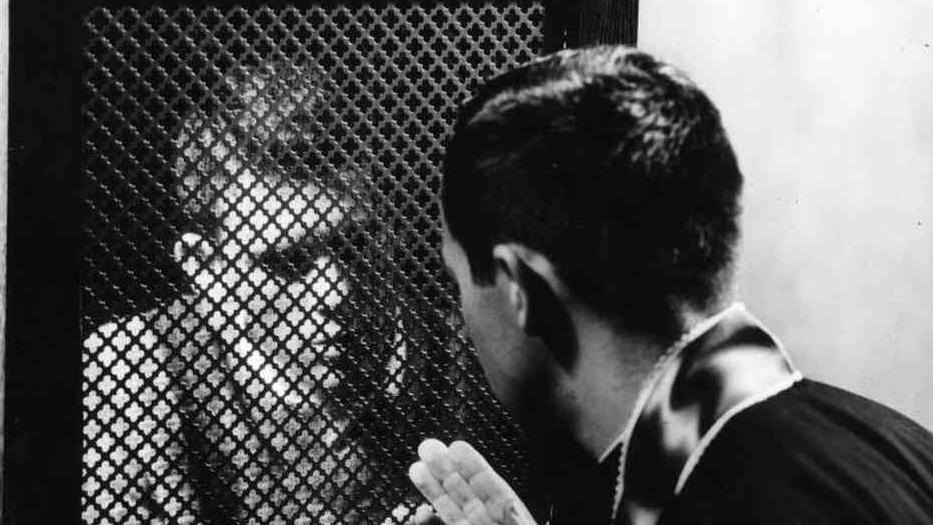I know many people in today’s society who carry around grave burdens of guilt that often eat them alive. Throughout the first 60 years of the last century, the Catholic confessional stood tall, dark and a little mysterious. Still, millions of Catholics were in the habit of confessing their sins privately and frequently.
Contrast that with a society that has lost a good deal of its connection with the private and the mysterious. But guilt still works its insidious psychological destruction even more than before. For many years, people found a secular salvation in the Oprah Winfrey Church of Public Confession. Guests on her TV show asked the crowd, not for communal forgiveness, but public validation of their sinful behaviors. Her show often reminded me of Jerry Springer’s weekly catfight minus the brutish men and the trashy women with their predictable fighting, screaming and swearing.
In the 1950s, Bishop Fulton J. Sheen used to warn about how Psychiatry had literally eliminated personal responsibility and true self-knowledge and growth from the moral equation. Many psychiatrists had counseled millions of patients to seek the cause of their anxieties and depressions outside of themselves. They looked first to parents, then siblings, employers, spouses and anyone else who has hurt them by being honest and deliberate.
This attitude contributed to the moral weakening of our society, especially our men. The perpetual adolescent of the Peter Pan Syndrome is a common affliction for millions of young men today. Not only have they and their enablers’ nurtured male immaturity and escape from responsibility but unlike Peter they are even afraid to fly. Pope Benedict lays some of the blame at the feet of the dictatorship of relativity. With its continuous deconstruction of Christian morality, moral relativism has permeated our society so deeply that millions of people, especially men contrive their morality on an ad hoc basis.
If there are no absolutes then, how can anyone judge anything? Each man and woman marches to the interior drumbeat of his or her own life values or style. No one is ever wrong and no one is right, except for those who picket Planned Parenthood killing centers or refuse to accept the homosexual anti-marriage agenda.
Worse than this are sociopaths, who practice no identifiable morality this side of the jungle or the cave. This helps to explain the observable decline in, not only public and private morality, but civility as well. People seem angrier and more hostile than ever before in my lifetime. And we live in a society that condemns any form of judgementalism, unless it comes from a Democratic White House or Congress.
How does this all relate to Eschatology? That’s where my views become speculative. There is an interior, subjective morality where people follow whatever interior voice they hear. We usually call that our conscience. In the objective sphere that most people call reality, we can judge and even punish the aberrant behaviors without condemning the souls of the doers. Their interior state is not our concern. I relegate this to the old adage–that’s between them and God, and their confessor and leave it at that.
Since this is all ostensibly about judgment, most people make judgments on the eternal disposition of their loved ones and even famous celebrities, such as Frank Sinatra and John Kennedy, even though their moral lives had many stains. We really don’t know if Sinatra is playing golf with St. John Paul II or if Jack Kennedy is talking about boating with St. Peter. This kind of presumption hints of a universal salvation, which was considered a heresy during the early part of the 20th century.
But I must say there is a Godlike innocence and even naiveté in those who have this kind of simple hope for other people. It could very well be a posthumous form of loving one’s neighbor, laced in human forgiveness. And Franciscan mystic, Father Richard Rohr has reminded us in his many books that the Church has never declared anyone specifically to be in Hell.
God is the eternal ticket-taker who determines where we get off the train of life. I wish we had an equally succinct way of describing the bliss of heaven. Fallen man finds it much easier to imagine the endless torments of Hell than the eternal joy of salvation. Maybe that’s because we have seen or even experienced countless scenes of Hell on earth throughout history.
More people remember Dante’s ghastly Inferno than his lovely Paradiso. And the great John Milton more successfully portrayed Paradise Lost than Paradise Regained. Comedians and cartoonists often quip that Hell can’t be so bad because we will meet so many more interesting people. Of course this view just demonstrates how childish such concepts really are. Or perhaps these childlike creatures are more pleasing to God than the rest of us cynics. The bottom line of eternity then, is there is nothing we can do to warrant, or deserve Heaven, save trusting wholly in God and his Divine Providence.
The only other people who really cast a huge shadow of doubt on their final judgments are the so-called hard-of-heart, whom Jesus condemned on every chance He could. But even with those it could be sinful for us to judge their final destinations because judgment of this absolute kind are not our Province.
I always thought that Joseph Stalin, old Uncle Joe, as FDR called him, during the war was far more evil than Hitler. Somewhere deep within my soul I hope that is the case. After all, I am not certain how absolute his free will was since many historians believe that he was mentally ill, even a psychopath.
Whatever the case, Judgment belongs solely to God and we can only hope, pray and trust that He has on his mercy tunic instead of His hanging judge robes. Personally, I think both types of presumption are wrong and even dangerous, especially the first one–even though I hope it is the correct one. Who knows, Adolph Hitler might be up in Heaven discussing moral philosophy with Albertus Magnus.








